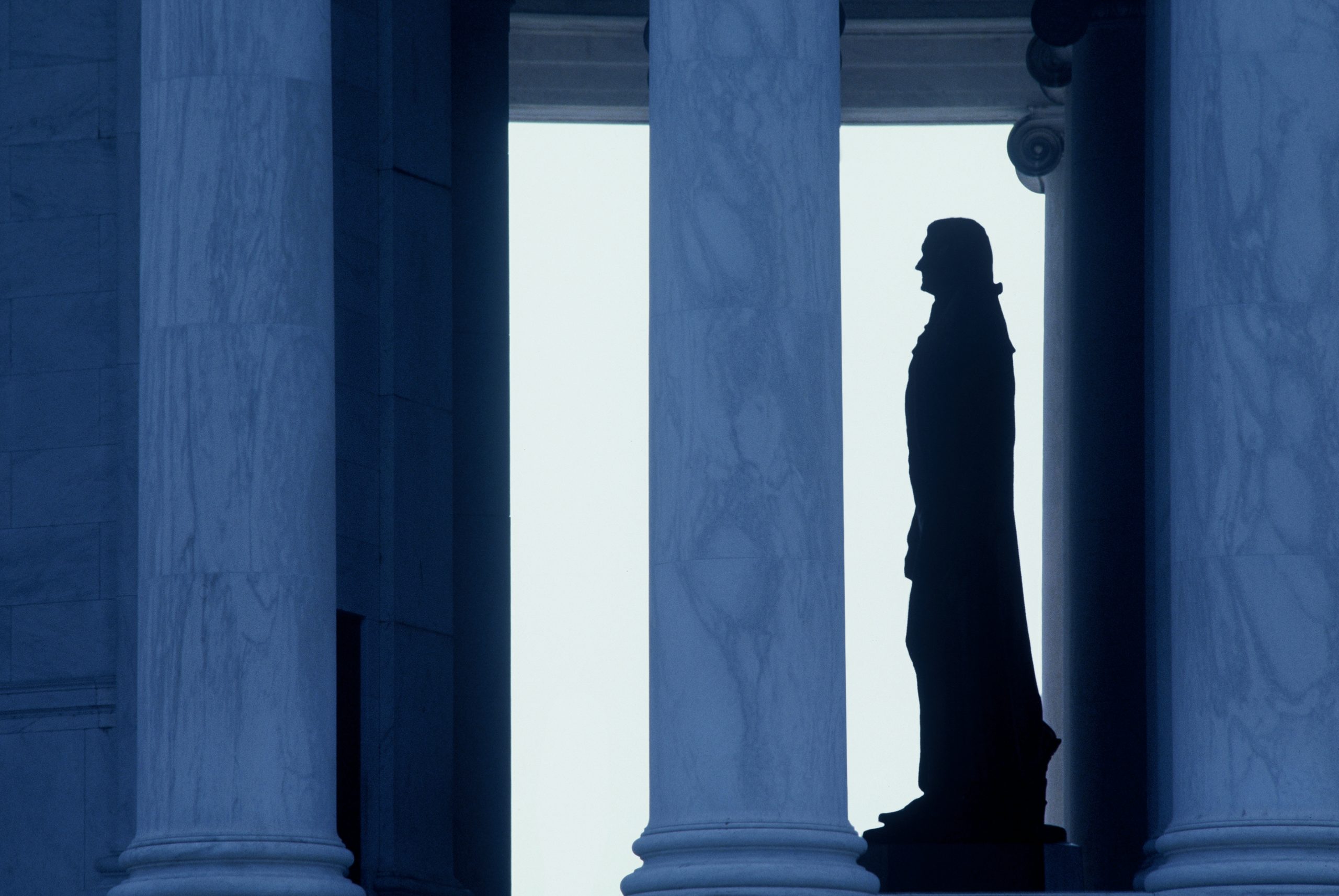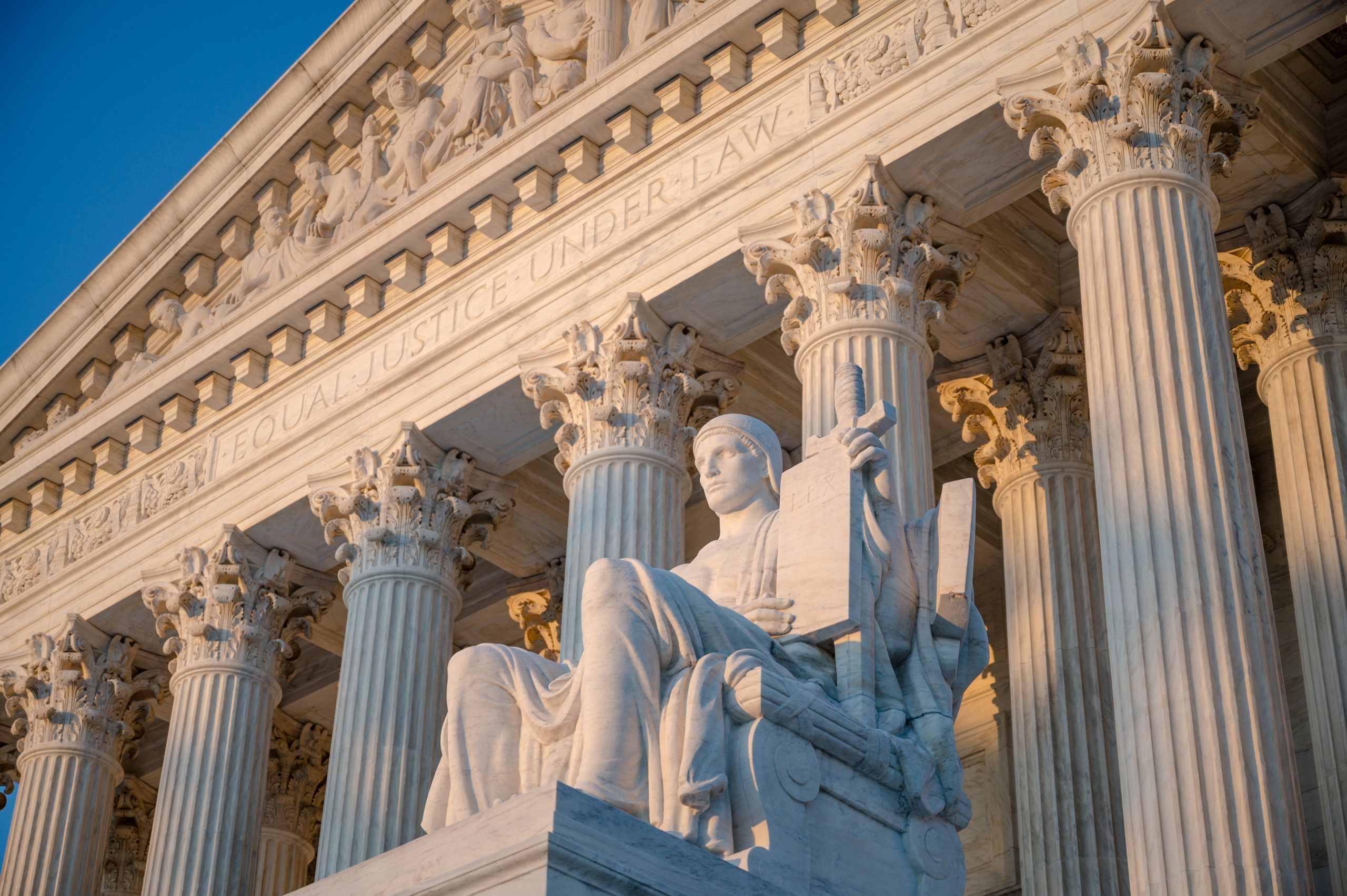Harry V. Jaffa rejected both the living constitution of the Progressives and the moral relativism of some conservatives.
How to Think About Harry Jaffa

At the crossroads of reason and revelation stands the American idea.
I was close to Harry Jaffa in his final years and saw him frequently. We spoke about many things, but mainly the topics that preoccupied what he called his “summing up”: Plato and Shakespeare. As his health failed toward the end, he was no longer able to read or use his computer. But as his body grew weaker, his mind took flight and soared into regions that were astonishing, even to someone who had known him for decades. He would quote long passages from Shakespeare or Plato as if he had just read them. One day he gave me an impromptu lecture on the Merry Wives of Windsor from which he quoted at length from memory. I asked him if he had recently reread the play and he answered: “I probably haven’t read it in 30 or 40 years.”
I asked him several times if I could record his musings, but he always refused with undisguised contempt, saying “just listen and think with me.” Always good advice, which I had frequently given my students. But coming from Harry Jaffa this was a special charge and a heavy burden that I was not certain I could bear. Still, it was one that was a great benefit to me, as Jaffa knew it would be.
On one occasion I arrived early in the afternoon to find Jaffa in an agitated and disconsolate mood. “What’s wrong, Harry?” I asked, not a little concerned. “I was just thinking,” he said, “what a tragedy it is that Socrates never had a chance to read Shakespeare’s Hamlet. He is the only one who could have understood the psychological depth and complexities of the play.” I was tempted to reply “Why Hamlet?” but I didn’t, knowing it was my obligation to think it through. His next reflection, which came in rapid sequence, was “I have been thinking about the connection between Hamlet and Macbeth, and how those two plays are essential for understanding Shakespeare.” Again, I didn’t dare respond, but I have more than an inkling of what Jaffa meant.
Jaffa, of course, is justly famous for his argument that Shakespeare was a Platonic poet, the one envisaged by Socrates at the end of the Symposium who could write both comedies and tragedies. Shakespeare’s political genius added Histories to his poetic repertoire. Jaffa made a simple but profound Platonic observation that in Shakespeare the difference between tragedy and comedy is determined by the presence or absence of philosophy. When a philosopher (or philosophic wisdom) is present, the play results in a comedy. Without a philosophic presence, it results in tragedy (philosophy, of course, is closer to comedy than tragedy). Shakespeare, according to Jaffa, accepted Machiavelli’s critique of Christianity’s detrimental influence on political life, but disagreed with Machiavelli’s radically new solution that required the lowering of the goals of political life to guarantee their actualization. Shakespeare, instead, looked to a revival of classical political philosophy as a solution.
In “Strauss at 100” (first published in May 2003), an essay that deserves to be read with more care than most of us have given it, Jaffa wrote:
I believe that Strauss believed that my restoration of Lincoln was the most apt way to restore the aforesaid authority [viz., the principles of the Declaration, mentioned by Leo Strauss the beginning of Natural Right and History], and that this was the form in which the statesmanship of classical political philosophy might become authoritative in our world. While Strauss articulated the connection between Plato, biblical religion, and medieval political philosophy, to discover the presence of classical principles in the post-classical world, he propelled my articulation of the connection between Plato, biblical religion, Shakespeare, and Lincoln. And Lincoln’s recovery of the Founding corresponded closely with the Maimonidean recovery of rational origins of prophecy.
Jaffa followed Strauss in pointing out that modernity was an attack on both classical rationalism and biblical religion—Reason and Revelation. As Strauss argued, however, the “secret vitality” of the West was the creative tension that existed between Reason and Revelation. He thus supported both Reason and Revelation against the corrosive effects of modernity and argued that they both agreed on the moral and political foundation of civil society—although they could never agree on whether what completes or perfects human life is reason and philosophy, or biblical faith. Jaffa writes that “whether the ultimate reason for choosing the moral virtues was obedient love of the living God or the goodness of the life of autonomous reason, was less important than their agreement on the moral order which must inform the life of decent society. From this perspective Revelation and Reason, Jerusalem Athens, were in agreement.”
The Secret Handshake
I say, that like Strauss, Jaffa, alone of the Straussians, made the theological-political question his principal concern, especially after he made his “second sailing” in the late 1980s. I do believe, however, that Jaffa pressed the question more explicitly and further than Strauss was willing to do.
Jaffa makes a curious, if not surprising argument, regarding Strauss’s quotation of Deuteronomy 4:6 in his “Autobiographical Preface” to Spinoza’s Critique of Religion, where Strauss remarks that “Jewish orthodoxy based its claims to superiority to other religions from the beginning on its superior rationality.” In the biblical passage Jaffa notes that “Moses tells the children of Israel that if they keep the laws he has set before them, the nations which shall hear these laws will say ‘Surely this great nation is a wise and understanding people.’”
Jaffa comments that “in citing this, Strauss seems to impute to the Bible something like the doctrine of the Meno, that learning is recollection, and that the recognition of wisdom is a human potentiality common to all nations. The suggestion here, however slender, is that the Bible is a Platonic book, and that reason is the esoteric foundation of revelation.” The Bible, which does not know the concept of nature, is a “Platonic book”! I have heard it argued that if the Bible is an explicit attempt to be an anti-philosophic account—i.e., to exclude nature and thereby reason—it is by that very reason a philosophic book and necessarily Platonic.
In January 2008, Jaffa composed a new introduction to Thomism and Aristotelianism in preparation for a new edition that the Claremont Institute was planning to publish. As with many important issues after his “second sailing,” Jaffa changed his mind about Thomas’ intentions regarding Aristotle. When he published Thomism and Aristotelianism in 1952, Jaffa recounts, “I believed Thomas’s intention was to make Aristotle safe for Christianity. I have since come to believe that his intention was to make Christianity safe for Aristotle.”
Jaffa notes his intention to append to this reprinting of his first book an article, “Thomas Aquinas Meets Thomas Jefferson,” which he published in 2006, that he seemed to promise would explain in full this cryptic (and critical) turn-about in his thinking. He adds another slightly less but still cryptic remark that he believed “the two Toms had more in common than either, in his time, would have wanted others to know. I have permitted them to shake hands under the table, practicing the art of writing that is a defense against persecution.” To my mind, this last sentence alone should motivate the Institute to complete its long-delayed republication of Thomism and Aristotelianism.
Does Jaffa reveal what’s behind the secret handshake? He certainly does not do so in any direct way in “Thomas Aquinas Meets Thomas Jefferson.” Jaffa did discuss Jefferson’s 1813 letter to John Adams where Jefferson says that it would have been inconsistent in nature to have formed man for the social state and “not to have provided virtue and wisdom enough to manage the concerns of society.” This means, not only that man is by nature a political being, but also that “that form of government is the best which provides the most effectually for a pure selection of these natural aristoi into the offices of government.”
Jaffa notes that Strauss had said this statement expressed “the very essence of the idea of the best regime in Plato and Aristotle, the very heart of classical political philosophy.” With characteristic hyperbole, Jaffa remarks that “the theme of nature’s fitting man for the social state, and providing virtue and talents for government, could hardly be more Aristotelian had it been written by Thomas Aquinas.”
Finally, Jaffa has resort to George Washington, quoting the famous lines from his inaugural address. “[T]he foundations of our national policy,” Washington said, “will be laid in the pure and immutable principles of private morality…. there exists in the economy and course of nature an indissoluble union between virtue and happiness.” Thus, Jaffa comments, according to the most authoritative statesman of the American founding era, “the actions of citizens and statesmen, whether private or public, must conform to ‘the eternal rules of order and right.’” Jaffa rightly concludes with this rhetorical question: “Wherein does this differ from Thomas Aquinas’s concept of the natural law, as the rational creature’s participation in the eternal law?” And here Tom meets George. But no matter: Tom, and Tom, and George were working, albeit at different times, for the same eternal purpose: the moral foundations of civilized life.
But what is odd is that we still haven’t seen clearly what was concealed by the secret handshake, apart from the general reflection that the reasonable man’s participation in the Eternal Law is at one and the same time the reasonable man’s participation in the natural law. Divine law and natural law—as in the Declaration of Independence—become identical and its principles are accessible to reasoning men regardless of time, place or religion.
Eternal Prudence
In 2009, Robert Kraynak published an article, “Moral Order in the Western Tradition: Harry Jaffa’s Grand Synthesis of Athens, Jerusalem, and Peoria,” to which Jaffa responded in a chapter in his last book, Crisis of the Strauss Divided: Essays on Leo Strauss and Straussianism, East and West. The title of the chapter, number 17, is a question: “Too Good to be True?” Here Jaffa takes up the argument where he left it off in “Aquinas Meets Jefferson.” Aquinas’s doctrine was that the natural law represented the rational creature’s participation in the eternal law, and the eternal law was, Jaffa continues,
the law of God’s government of the universe. By this doctrine Homo sapiens could by his reason (that is to say by the perfection of his reason) participate in God’s government. In this, there is no necessary participation of positive divine law. According to Jefferson’s statute [on Religious Liberty], a man’s civil rights have no more dependence upon his religious opinions, than his opinion in physics or geometry. It seems shocking to suggest that Thomas Aquinas had similar views. Yet the possibility of the direct participation of human beings, possessed of reason (but not necessarily Christian faith) in the divine government of the universe, would certainly seem to entitle them to an equal possibility to participate in civil government. This would mean, for example, that Jews or Infidels, no less than Christians, had that right. This perfectly correct Jeffersonian inference from Thomas’s premises is one that Thomas did not make and would no doubt have denied. He would have denied it for the same reason that Lincoln in 1858 denied any intention to make voters or jurors of Negroes or of permitting them to marry whites…. Lincoln’s proximate goal was arresting the spread of slavery into the territories. To have advocated voting rights for Negroes in Illinois in 1858 before the Civil War would only have divided those who were united in their opposition to the extension of slavery. Lincoln made it clear that in his mind stopping the spread of slavery was only the first step on the road to ultimate extinction. He did not in 1858 address the question of what might become prudent when the end of that road was in sight. Similarly, Thomas was engaged in a great effort to bring reason (as distinct from unreasoning prejudice) into Christian doctrine. The benefits that might eventually accrue to Jews or Infidels from that effort were not something that he could prudently bring to the attention of inquisitors hunting for heretics to burn. This comparison illuminates the fact that at different times and places religious prejudice and racial prejudice are among the most powerful obstacles to reason that prudence must circumvent. Prudence counsels caution and indirection in the face of such obstacles, but compromises do not of themselves imply a lack of principles.
Jaffa draws his greatest comparison here, not between the two Toms, but between the first Tom and Lincoln, where the greatest prejudice is not religious, but racial. We must always keep in mind, however: Lincoln said his political philosophy was always that of Jefferson and, in any case, the irrationality of both forms of prejudice lead to political tyranny. Now we know why the two Toms were shaking hands under the table—it was a matter of prudence.
The revelation of the full extent of their thought would have been political dynamite. Prudence is therefore the center of the theological-political question; it is at the heart of natural right, which, according to Aristotle, has everywhere the same force or power, but is everywhere changeable. The statesman, the man of practical wisdom, can mediate between what is eternally just and what is possible under changing circumstances. In order to know what is best under a variety of circumstances, phronimoi must know what is best simply. Prudence is a moral virtue, both theoretical and practical.
Jaffa’s last word on prudence caused quite a stir among Eastern Straussians who seem to believe modernity has rendered prudence either superfluous or impossible. After all, Machiavelli had succeeded in destroying the possibility of natural right. In post-Machiavellian regimes, natural rights, plural, had become the “low but solid” substitute for natural right, singular. Self-preservation would henceforth be the object of government—or in the case of Locke, property and the emancipation of acquisition. The distinction between ancients and moderns was for the East an eidetic bridge that could never be crossed, and those who believed it could were simply uninitiated in the mysteries of esotericism.
Jaffa reevaluated his analysis of Aristotelian natural right, concluding that for Aristotle, prudence and natural right were one and the same. Since natural right was a part of political right and was everywhere changeable even though it everywhere had the same force or power, prudence or practical wisdom, the political virtue par excellence, must be the same, if not identical, with natural right. “The prudence of the Declaration is the prudence of Aristotle and Lincoln,” Jaffa wrote, “because there are not two kinds of prudence. While the manifestations of prudence are as many as the circumstances in which prudent action is possible, the virtue itself remains one and the same. This is why regarding Aristotle and Locke as representing opposing and contradictory philosophic doctrines is mistaken. The assumption that there is such a difference is the nerve of the difference between Eastern and Western Straussians.”
Some years ago I mentioned to Jaffa that I thought his criticism of the American Founding in Crisis was grossly exaggerated, and I said there was ample evidence that the exaggeration was deliberate, and perhaps insincere or ironic, undertaken to magnify the achievements of Lincoln in “refounding” a “defective” regime. Jaffa said that he thought my observation was accurate and that he knew at the time he was somehow wrong to criticize the Founding to the extent that he did. There were passages that indicated his hesitations, but during the time he was writing Crisis he heard the constant whispers of Walter Berns and Martin Diamond late at night while he was at work: “don’t forget, ancients and moderns, ancients and moderns.” “I was haunted by those whispers,” he said, and “I couldn’t entirely escape what was the Straussian orthodoxy at the time.”
Jaffa, however, as we have seen, came to realize that Strauss’s main concern was not ancients and moderns but Reason and Revelation. As Professor Thomas West has suggested, “ancients and moderns” was mainly a rhetorical and pedagogical device, to make the study of the classics attractive to students. Berns and Diamond, like most of the Eastern Straussians, never outgrew that early orthodoxy.
Berns, at one point, attacked Jaffa’s theological-political analysis of the founding principles by making the absurd argument that the idea of natural rights itself was incompatible with Christianity and that the founders were well aware of that fact. How did Berns know this? Because Hobbes was the putative founder of America! And Hobbes was an atheist! QED! Another East Coast Straussian orthodoxy was exploded by Jaffa when he argued that the framers read Locke as an “Aristotelianized Locke” or a “Lockianized Aristotle.” In either case, Aristotle’s influence on the American founding is there for everyone with eyes to see. The battle between Berns, who learned the early Straussian orthodoxies and nothing else, was vigorous, but he was no match for Jaffa—as few were in the kind of polemical dialectic in which Jaffa excelled.
A previous author who wrote a dual intellectual biography of Berns and Jaffa fatuously claimed that in the end there were no real differences between Berns and Jaffa, that they had more in common than they suspected. This suggests that neither Berns nor Jaffa understood themselves. Berns would (characteristically) have been enraged at this author’s statement; Jaffa would have rushed to his computer to reply to such an ignorant and foolish statement—he replied to everything, even to things that didn’t deserve replies. Thus the author of the dual intellectual biography of Berns and Jaffa not only thought the two thinkers didn’t understand themselves, but he didn’t understand them either!
According to Jaffa, “Christian monotheism” was the ground of the “consent of the governed” in the Declaration. Berns’s claim that the founders knew their work was deliberately anti-Christian hardly provides the ground for agreement. This same author wrote that the theological-political question to which Jaffa turned his energies after the 1980s didn’t seem to be relevant to “current American politics.” This statement could only be true of Jaffa’s work if Jaffa had not come to believe that the theological-political question was the key to understanding the principles of the Declaration of Independence and thereby the American Founding; and who can doubt that it was Jaffa’s abiding conviction that the understanding of the American Founding was essential for understanding “current American politics”?
Here I recommend Jaffa’s essay, “The Decline and Fall of the American Idea: Reflections on the Failure of American Conservatism,” in The Rediscovery of America: Essays by Harry V. Jaffa on the New Birth of Politics (2019), an essay written in 1996 which predicts every aspect of American politics that has developed today. I will leave it to any careful reader of this essay to judge whether the theological-political question has become irrelevant to current American politics.
Under God
Glenn Ellmers has written a much better book on Jaffa. He had exclusive access to the Jaffa papers at Hillsdale College and has extensive knowledge of his works, both published and unpublished. I had many conversations and email exchanges with Ellmers while he was writing the book and I knew it was going to be a good, serious work about Jaffa’s thought. And so it is. (It is probably a better book because he didn’t take much of my advice!) It is a well written and lively account, although those sections with bullet summaries of Jaffa’s positions on various topics tend to be confusing.
Ellmers follows Jaffa’s criticism of the East Coast Straussians that they believe political philosophy begins with metaphysics, whereas Jaffa, the leader of the West, insisted that political philosophy begins with opinion and ascends dialectically in an attempt to replace opinion by truth. This was Socratic rationality, which put morality at the center of political philosophy as a way of life and as an object of political inquiry.
Ellmers understands Jaffa’s work in precisely this manner, but he himself has an unmistakable attraction to metaphysics. He spends an inordinate amount of time trying to determine whether or not there are Hegelian elements in Jaffa’s work. Jaffa frequently speaks of providential history, the historical process, and indulges the repeated assertion of what Ellmers characterizes as “affirmations of historical determinism.” Can Ellmers really take seriously these Hegelian-sounding phrases as evidence of Jaffa’s Hegelianism? I think it is Ellmers’ neglect of the political side of the “theological-political” question that leads him on this wild-goose chase.
Strauss remarks that once natural right is discovered it can be easily adapted to the regnant theology. It can reform that theology by making it more reasonable, but it cannot confront it in a way that that would make further reform in the future impossible. The political side is the realm of statesmanship, the realm of prudence and practical wisdom, not metaphysics. No one could seriously entertain that Jaffa was an Hegelian of any stripe, even though he may have used such Hegelian-inspired language as “providential destiny” and the “historical process.”
Ellmers nevertheless does take the theological-political problem in Jaffa’s work seriously (he devotes a chapter to it), but it is of little avail to ask whether Jaffa after many years changed his mind (or contradicted himself) on the question of God and necessity (he did not). This is another example of Ellmers’ attraction to metaphysics that only serves as an actual distraction from the theological-political issue. All in all, however, Ellmers does understand the importance of the question both for Strauss and Jaffa and how his turn to the question informed his deeper understanding of the Founding.
Strictly speaking, the theological-political question arose only after the establishment of Christianity, when the conflict between divine law and secular law became acute, or as Jaffa stated it “the tension between the transcendence of the City of God, based upon faith, and immanence of the earthly city” based on secular law. Jaffa maintained that the tension was resolved by the principles of the Declaration, the supreme act of statesmanship of the American Founders. “Correctly understood, the principles of the Declaration represent the principles of classical natural right in the most perfect form possible in a political world dominated by Christian monotheism.”
Of course, classical natural right had to be adapted to a new regnant theology—monotheism. Natural right, among other things no less important, had to assume the guise of natural law, and it had to rest on social compact which was inherent in the Declaration. “Before such a contract could be envisaged,” Jaffa wrote, “the polytheism of the classical world had to be replaced by the monotheism of Christianity. Christianity transformed the covenant of God with Abraham, patriarchal covenant with a particular people, into a covenant with all mankind, or at least to anyone of all mankind who accepted the covenant.” The consent of the governed replaced divine right of kings as the legitimate basis of government and limited government with a “politics free from sectarian religious passions” became “absolutely necessary if there was to be constitutional government.”
East Coast Straussians, of course, denounced social compact as a sign that the American Founding was wholly modern, redolent of Hobbes and Locke, rather than Aristotle who had maintained in the Politics that the polis existed by nature not by human artifice. Jaffa deftly pointed out, however, that in Aristotle, the polis does in fact require a founder, someone who “sets up” the polis and who, by doing so is a great benefactor to mankind. The polis is described by Aristotle as the last in order of temporal causality, following the family, the village, and the tribe, but first in the order of final causality. Those associations that are prior in time are incomplete and point to the polis as the final cause, and as we learn from Aristotle the final cause is nature, so the polis, even though it needs an artificer—someone to set it up—is natural. Otherwise man could not be by nature a political animal.
The social compact, the American Founders’ solution to a theological-political problem, used classical philosophy to perfect the principles of the American regime under the conditions of monotheistic religion. Almost certainly this was the first time in history that reason and revelation agreed on a moral and political level about the purposes of political life. Without this moral agreement, as we have mentioned, civil life would be impossible. But, of course, this agreement would not last forever—after all it was a political agreement—and however much Providence might have conspired to create the conditions for the agreement, it was still subject to the vagaries of chance (or as Lincoln believed Providence). In 1861 the first shots in the Civil War were fired, a war which Jaffa argued was essentially a war of religion where both sides prayed to the same God for victory and each side of the slavery question used biblical text to justify its position.
These Things Endure
Ellmers notes that Jaffa’s preoccupation, apart from Lincoln, seems to be Aristotle. Jaffa no doubt accepts Aristotle as his authority on prudence and natural right because, as he came to understand, in Aristotle natural right and prudence are identical. This line of thinking had been developing in Jaffa’s thought for some time. For Aristotle natural right is a part of political right, and is therefore more or less available wherever politics exists. If the polis exists by nature, then natural right is always a potential of political life. This means that if prudent men, phronimoi or wise statesmen, are present then some simulacrum of justice or natural right might be available depending on the circumstances, even though it may only be the choice of the lesser of two evils.
But in A New Birth of Freedom Jaffa made the remarkable statement that “We must face the reality…that in the long experience of mankind, the self-evident truths of the Declaration of Independence had never, before 1776, been the basis of the experiment of popular self-government. This in itself is sufficient to raise the question of whether it was utopian to think that mere abstract truth could serve as the basis of an actual political regime. It is to ask the question that Plato himself asked, but did not answer, of whether natural right could become political right.”
If we read carefully, I say neither Lincoln nor Jaffa answers Plato’s question. Lincoln in his Dred Scott speech of 1857 says that the Declaration provides a “standard maxim for free society, which should be familiar to all, and revered by all; constantly looked to, constantly labored for, and even though never perfectly attained, constantly approximated, and thereby constantly spreading and deepening its influence, and augmenting the happiness and value of life to all people of all colors everywhere.” This is a perfectly Platonic idea: there can be participation but not perfection. This, of course, is the moderation or limitation of Platonic politics.
The principles of the Declaration, according to Lincoln, will never be perfected, but they can be approximated. Platonic natural right can never be translated into political right in the same sense as Aristotelian natural right. But as regards today’s crucial task of opposing the corrosive forces of modernity, the differences between Plato and Aristotle pale into insignificance compared to their agreements about the moral foundations of political life that are derived from the principles of human nature, those principles embodied in the Declaration of Independence.
Both Plato and Aristotle teach eternal principles, those principles necessary to combat the relativism, historicism, positivism and nihilism that infect our age, including many American conservatives who routinely pledge fealty to the principles of the Founding but who are confused about its true meaning, thinking its meaning is merely abstract or one among many “value judgements” that we as Americans happen to hold.
A kind of Providential dispensation allowed the reconciliation of Reason and Revelation on a moral and political level to grace the American Founding. The “Laws of Nature and of Nature’s God” in the Declaration rest on the twin pillars of Reason and Revelation, and the defense of the American Founding principles is today the most powerful defense of the West—and almost certainly the last best hope of the West. No one understood that better than Leo Strauss. All of his works were, in one way or another, a defense of the West. Jaffa extended Strauss’s work to a defense of America. Glenn Ellmers has given an important reason to think more seriously about Jaffa’s significant contribution to this important battle for the survival of the West.
The American Mind presents a range of perspectives. Views are writers’ own and do not necessarily represent those of The Claremont Institute.
The American Mind is a publication of the Claremont Institute, a non-profit 501(c)(3) organization, dedicated to restoring the principles of the American Founding to their rightful, preeminent authority in our national life. Interested in supporting our work? Gifts to the Claremont Institute are tax-deductible.
Harry V. Jaffa's work and teaching was not enslaved to the fashions of his day.
Reflections on Harry V. Jaffa from a grateful student.
Rescuing America is the great task of this generation's best.
Harry V. Jaffa helped save American history from Progressive historicism.
Glenn Ellmers's new book on Harry V. Jaffa teaches urgent lessons for our fractious politics.






